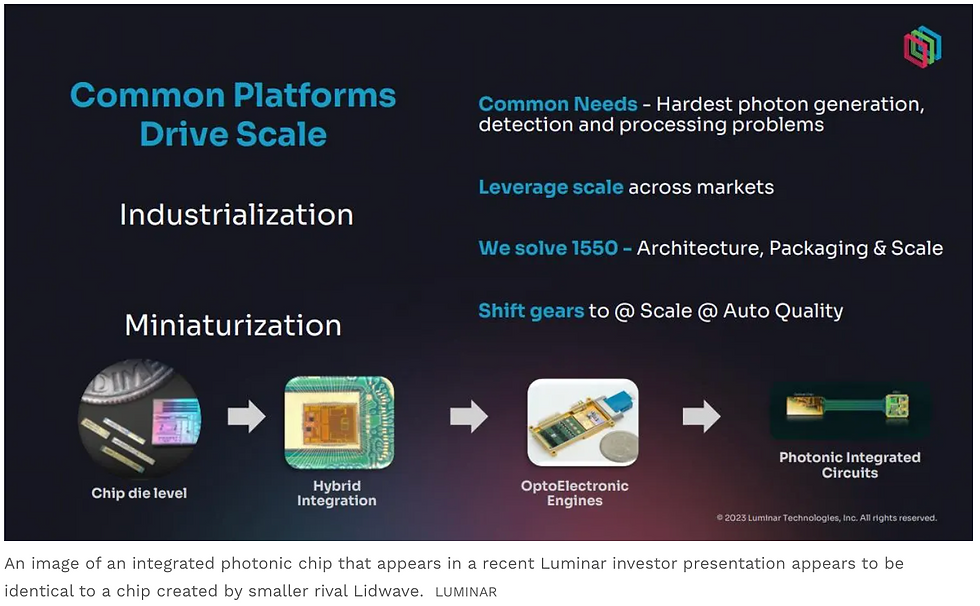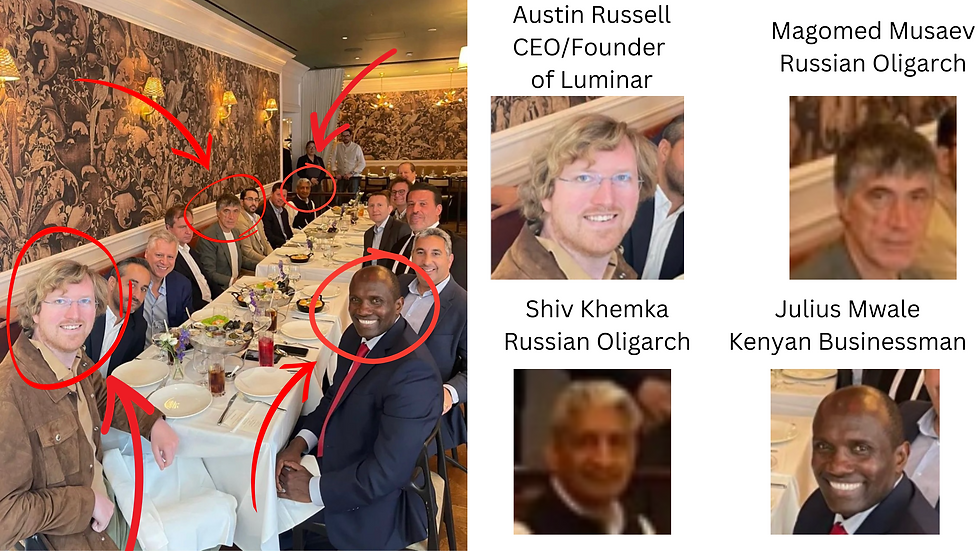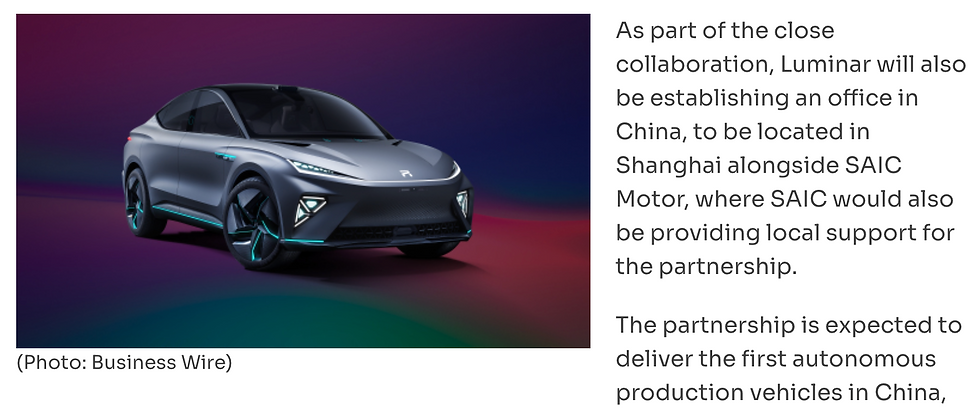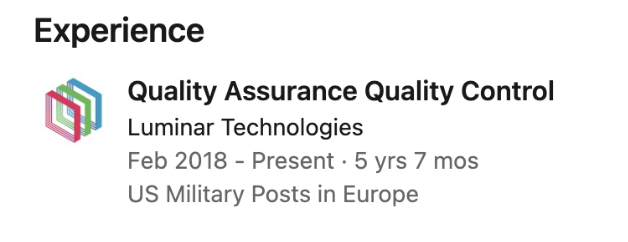What is Luminar Technologies? (LAZR) | Culture, Funding, and Legal Concerns
- Dante Welch
- Sep 18, 2023
- 5 min read
Updated: Oct 28, 2023
Overview
During our investigation of Rodger Cleye, we naturally stumbled upon his workplace - Luminar Technologies. More importantly, Rodger co-founded Luminar with his nephew Austin Russell. Austin became the youngest "self-made" billionaire in the world because of Luminar.

Luminar Technologies Inc. is a technology company that develops vision-based lidar and machine perception technologies, primarily for self-driving cars. Austin Russell is the CEO and founder. Austin’s uncle is Rodger Cleye, one of the other co-founders. Austin received a $100,000 fellowship from Peter Thiel in 2012. From 2012-2017, Luminar was in "deep stealth." Very little is known about what was happening at Luminar during this time, although there are videos on Rodger Cleye's YouTube channel showing the two working on a variety of "silly" projects together throughout the period.
 |
This article will serve as an overview of some basic information uncovered about Luminar Technologies that will be important to understand as this story/scandal unfolds.
Culture Concerns
Tweets from an anonymous account in 2021 alleging an internal investigation occurred at Luminar revealed information about a female employee that allegedly “grooms male employees to be affectionate with them, asks for physical attention, and talks in a sexual manner”. The user also alleges that this employee “admits [she] has a husband” and “also [has] kids who work there.” The employee is named in the tweets as Maria Santiago of Luminar Orlando’s Quality Department. Through a LinkedIn search, it appears that she is still employed at Luminar and works primarily on “US Military Posts in Europe.”
This same anonymous user also alleges the following of Luminar in Orlando:
“Unfortunately sexual harassment is rampant at Luminar especially with the use of its employees’ digital tools. So while he [Austin Russell] is donating his gobs of money I hope his staff protects his employees this year.”
“Luminar (Orlando) has a serious problem. Insider says they work their employees to death, are disorganized, promote a sexual workplace & are “faking it until they make it” with “technology.” HR/mgmt is fearful and employees mentally ill while boy CEO makes billions”
There are also a number of negative reviews on Luminar’s Glassdoor Page that raise troubling concerns about the company's culture.
Lawsuits
Luminar is currently dealing with a lawsuit involving CEO Austin Russell swing trading Luminar (LAZR) stock. According to Fidelity: "Swing trading refers to the practice of trying to profit from market swings of a minimum of 1 day and as long as several weeks. If losses can be kept to acceptable levels using stop-loss techniques, swing trading can be profitable and provide a good perspective to learn about both the short-term and long-term market movements. The downside of swing trading is that you must work hard all the time to manage trades, which means you might miss out on potential profits due to market moves."
Defendant: Austin Russell, key roles in Luminar - Chairperson, President, CEO, and controlling stockholder.
Plaintiff: Roth, on behalf of Luminar.
Allegations:
Russell potentially violated Section 16(b) of the Securities Exchange Act of 1934, which targets "short-swing transactions" by insiders.
He sold 10.5 million shares at $21 each on July 1, 2021.
Later in December 2021, Luminar repurchased over 15 million shares at an average price of $15.45.
Main Concern:
As an integral figure in Luminar, Russell had heightened obligations. The sale and subsequent company repurchase could suggest he acted on insider information, abusing his position.
Source: Grant Stern (Occupy Democrats)
Luminar is also facing a lawsuit accusing them of using a competitor's product to promote their own in a presentation to investors.
Defendant: Luminar Technologies, Inc. (NASDAQ:LAZR).
Plaintiff: Levi & Korsinsky, LLP, representing affected investors who acquired Luminar securities between February 28, 2023, and March 17, 2023.
Allegations:
Luminar falsely used an image of a competitor's photonic integrated circuit (PIC) for its own product promotion.
Mike McCauliffe, who has served as Chief Executive Officer (“CEO”) of the Company’s Luminar Semiconductor subsidiary at all relevant times, gave a presentation to investors using the image.
The lawsuit alleges that McCauliffe “knew that the adverse facts specified herein had not been disclosed to and were being concealed from the public.”
This behavior made the company vulnerable to potential litigation and/or regulatory scrutiny.
Such revelations would likely adversely affect Luminar's business reputation.
As a result, Luminar's public communications during this period were deceiving.
Main Concern:
Luminar's alleged misleading practices and the potential negative ramifications for investors who acquired securities during the specified timeframe.
Source: Levi & Korsinsky, LLP

Funding and Influence
Luminar is funded by some of the most influential entities in Silicon Valley, global politics, and the media. These entities are very transparent about their values and goals. These values and goals are primarily self-serving and are not in the best interest of the citizens of the United States. The most notable sources of funding and potential influence include:
Peter Thiel provided Austin with his initial funding with a grant through the Thiel Fellowship. Thiel is a prominent tech billionaire and has re-emerged as a significant financier of the Make America Great Again (MAGA) movement. He has donated over $20.4 million to support conservative candidates, many of whom promote conspiracy theories espoused by former President Donald Trump. His focus is on hard-right candidates who oppose the Republican establishment. Thiel's contributions and influence have the potential to shift views from the fringe to the mainstream and position him as a new power broker in American politics. In his 1995 book "The Diversity Myth," Thiel critiques multiculturalism and political correctness on college campuses, arguing they suppress genuine intellectual diversity. The book showcases Thiel's libertarian leanings and his skepticism towards collectivist ideologies. Thiel has since further embraced this ideology and has amassed the resources to influence American politics.
1517 is a venture capital group that provides early-stage investment and community support to college dropouts, unconventional students, and advanced tech researchers for their startups. 1517 is backed by Peter Thiel and one of the founders is Michael Gibson, who authored the book “Paper Belt on Fire.” The book details Gibson’s political ideology and it aligns very closely with Thiel’s. The name ”1517” comes from the year Martin Luther nailed his theses to a church door. Martin Luther is often revered for his role in the Protestant Reformation, but he also held anti-Semitic views, which are documented in some of his writings, most notably in "On the Jews and Their Lies." Hitler and the Nazi Party selectively exploited Luther’s writings to legitimize their own anti-Semitic beliefs and it has been suggested that Luther's views laid the foundation for the rise of nationalist and anti-Semitic sentiments in Germany.
Magomed Musaev is the owner of Forbes Russia and helped bring Austin into the deal. Musaev formed the venture capital firm GVA. GVA has managed money for the Russian oligarch Suleyman Kerimov. Kerimov is currently sanctioned by the United States, the EU, Canada, as well as other major world powers. Kerimov “has ties to a covert financial network believed to hold Putin’s secret wealth” and “was one of a select group of powerful oligarchs summoned by Putin to Moscow on the day Russia invaded Ukraine.” Russell’s company was “launched with the help of $20 million of Kerimov’s wealth.”

SAIC Motor Corporation is a state-owned Chinese company and the country’s largest automaker. SAIC and Luminar established a partnership in March 2021.

This article provides a very high-level overview of Luminar, its current known issues, and where much of its funding comes from. Future articles will dive into more detail about many aspects of Luminar, so keep an eye out.




























